新概念英语第二册第57课
- 格式:ppt
- 大小:2.54 MB
- 文档页数:5
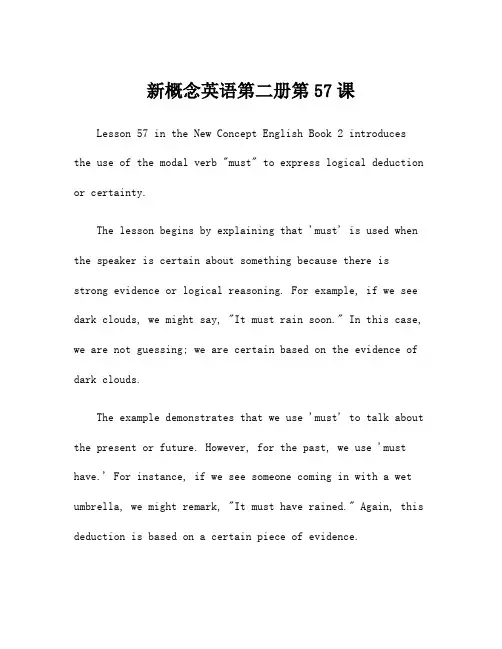
新概念英语第二册第57课Lesson 57 in the New Concept English Book 2 introduces the use of the modal verb "must" to express logical deduction or certainty.The lesson begins by explaining that 'must' is used when the speaker is certain about something because there is strong evidence or logical reasoning. For example, if we see dark clouds, we might say, "It must rain soon." In this case, we are not guessing; we are certain based on the evidence of dark clouds.The example demonstrates that we use 'must' to talk about the present or future. However, for the past, we use 'must have.' For instance, if we see someone coming in with a wet umbrella, we might remark, "It must have rained." Again, this deduction is based on a certain piece of evidence.The lesson further explains that if we think something is not possible, we use 'can't.' For instance, if we arrive at a bus stop and the bus has already left, we might say, "The bus can't still be here," implying that the bus has already left and it's impossible for it to still be there.The text also provides additional examples using 'must' and 'can't' for different situations. It discusses logical deductions such as a doctor telling a patient that they must rest, a car not starting because the battery is flat, and a small child unable to reach things on a high shelf.In conclusion, Lesson 57 emphasizes the use of 'must' and 'can't' to express logical deductions or certainty in English. These modal verbs are used to convey strong evidence orlogical reasoning regarding a particular situation in the present, future, or past.。


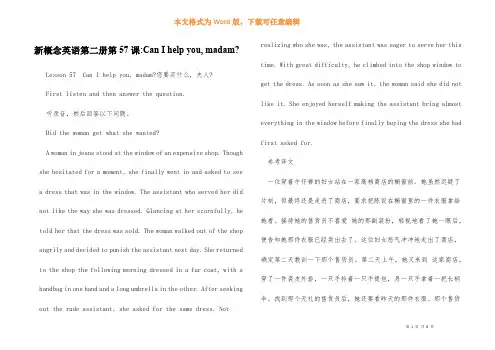
新概念英语第二册第57课:Can I help you, madam?Lesson 57 Can I help you, madam?您要买什么,夫人?First listen and then answer the question.听录音,然后回答以下问题。
Did the woman get what she wanted?A woman in jeans stood at the window of an expensive shop. Though she hesitated for a moment, she finally went in and asked to see a dress that was in the window. The assistant who served her did not like the way she was dressed. Glancing at her scornfully, he told her that the dress was sold. The woman walked out of the shop angrily and decided to punish the assistant next day. She returned to the shop the following morning dressed in a fur coat, with a handbag in one hand and a long umbrella in the other. After seeking out the rude assistant, she asked for the same dress. Not realizing who she was, the assistant was eager to serve her this time. With great difficulty, he climbed into the shop window to get the dress. As soon as she saw it, the woman said she did not like it. She enjoyed herself making the assistant bring almost everything in the window before finally buying the dress she had first asked for.参考译文一位穿着牛仔裤的妇女站在一家高档商店的橱窗前。
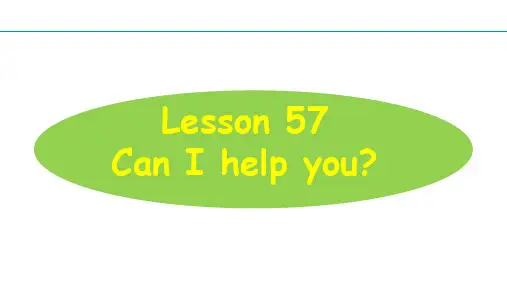
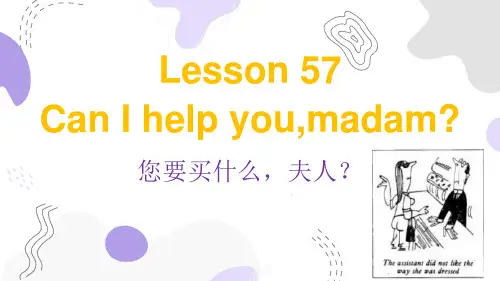

madam 女士jeans 牛仔裤 a pair ofjeans 一条牛仔裤hesitate 犹豫serve 接待为某人服务scornfully 轻蔑地punish v 惩罚 punish sb for/doing因为什么惩罚某人fur 裘皮eager 热情的 be eager to do盼望做某事at the window 在窗旁expensive shop 高档餐厅hesitate about= hesitate at 对..犹豫不决She has hesitated about the choice of the two dress 她对这两个裙子选哪一个犹豫不决He hesitate at nothing 他对什么事都毫不犹豫hesitate to do 不情愿做某事She hesitate to take such a big risk她不情愿冒这么大风险ask to do 要求做某事be dressed in 穿着与 wear 互换 be dressed up as 打扮着什么He will be dressed up as Father Christmas 他将会打扮成圣诞老人glance at 一瞥什么动作 glimpse 瞥见结果the following morning =the next morning 第二天早晨seek 寻找 sought –sought及物 seek sb/sth 寻找某人某物不及物 seek aftersb/sth =seek for sb/sth 寻找某人某物They are seeking after the solution to the problem他们正寻找解决问题的方法On+节日在..那天 In +节日在..的时候 (期间)with difficulty 费力地有困难地have difficulty (in)doing sth 费力做某事We found his house with great difficulty yesterday我们昨天费了很大劲找到他的家不定式做目的状语位于句尾不能使用逗号与句子隔开enjoy oneself doing 做某事很开心很愉快on doing sth 在做某事的时候trump 流浪汉 v 徒步旅行人在街道上是in 建筑物在街道上是onoff 从..离开 jump off the tree 从树上跳下来be supposed to be 应该是scar 伤疤novelist 小说家the man in hat 戴帽子的男士make sb do 让某人做approve of 赞成支持revenge 报复get one’s revengeon 报复某人ahead of 方位在。
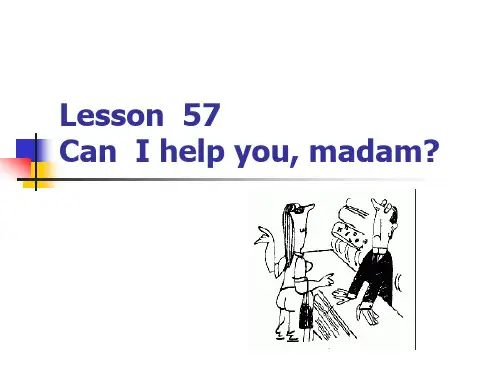
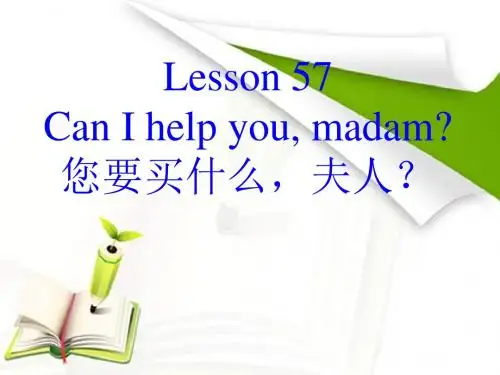
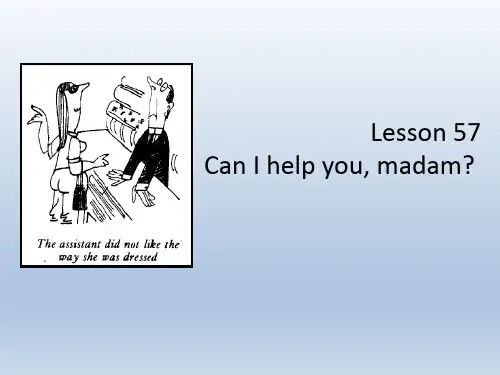

Lesson 57 Can I help you, madam? 您要买什么,夫人?学习目标全解必记单词madam n. (对妇女的尊称)太太,夫人jeans n. 牛仔裤hesitate v. 犹豫,迟缓serve v. 接待(顾客)scornfully adv. 轻蔑地punish v. 惩罚fur n. 裘皮eager adj. 热切的,热情的常考短语hesitate for a moment 犹豫了一会seek out 找出glance at 撇一眼with great difficulty 很困难地the following morning 第二天早晨enjoy oneself 玩的开心be eager to do sth. 急于做某事经典句型1. A woman in jeans stood at the window of an expensive shop.Though she hesitated for a moment, she finally went in andasked to see a dress that was in the window.2. The assistant who served her did not like the way she wasdressed.3. Glancing at her scornfully, he told her that the dress was sold.The woman walked out of the shop angrily and decided topunish the assistant next day.4. She returned to the shop the following morning dressed in afur coat, with a handbag in one hand and a long umbrella in theother.5. After seeking out the rude assistant, she asked for the samedress.6. Not realizing who she was, the assistant was eager to serveher this time.7. With great difficulty, he climbed into the shop window to getthe dress.8. She enjoyed herself making the assistant bring almosteverything in the window before finally buying the dress shehad first asked for.重点语法介词at, in, off and with的用法在表示地点和位置时,说话人的个人角度会影响对介词的选择。